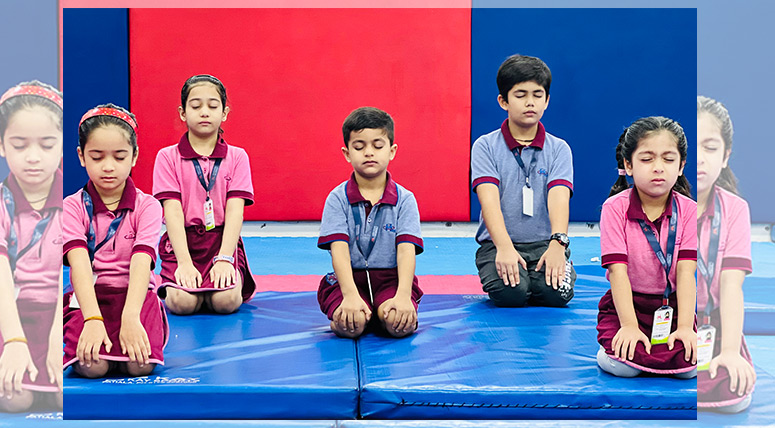Meditation Therapy IS THE BEST STRESS BUSTER FOR MANAGING MENTAL HEALTH!
“Being silent to explore your soul and experiencing that the divinity is taking care of everything, is the best form of stress buster”

Being introduced to a global humanitarian organization by one of my friends in 2015 has been a life changing experience for me. With this began the turning point of my life and the journey of understanding meditation and eventually practising the same. In what was called ‘Happiness Program’ I encountered for the very first time ‘regulated and conscious breathing.’ As the organization mentions, this ‘conscious breathing’ incorporates specific natural rhythms of breath which harmonizes the body, mind and emotions such as anger, frustration and depression- leaving you calm, energized, focused, and relaxed.

Regulated breathing is one of the ways of meditation which helped me take out time from my busy schedule and unending tasks life throws at me. I slowly learnt how to ace certain steps.
However, I am not propagating the vision to join any special program to practise meditation. Staying calm and trying to register our emotions can be a stepping stone towards meditation. It is a slow process. Slow rhythmic breathing has a calming effect. It is not easy to become quiet all of a sudden. Our minds work constantly. We think. We recall. We plan. We regret. We rejoice. There is a plethora of emotions that we feel in a day.
Today’s busy lifestyle keeps our brains in active mode, even while we try to sleep. It is a challenge when we sit to meditate. The very first step I learnt is to let the thoughts flow and be conscious of them. Accepting reality is the key. Meditation is not a magic spell that can take away our stress and make us happy. That is an unrealistic expectation of meditation. Meditation equips one to accept the reality and face challenges in the best possible way.
The clutter in the mind needs to be addressed. Once we let thoughts flow, we have to focus on our body, in a very slow and relaxed manner. Focusing on the breath is important. The breath is what gives us life or ‘prana’. It is of vital importance to our existence. Hence being in rhythm of our breath is important. Gradually we move towards slow deep breaths and being conscious of every inhalation and exhalation. This requires practice and can be learnt over a period of time. It teaches patience. It helps one to deal with life situations in a better way. It helped me deal with stress. The loss of a loved one had caused me a lot of distress. It helped me sail through those tough times. My soul felt lighter. It helped me let go the past. Regular meditation is important. I strive to be regular in practising meditation.

Meditation is beneficial for people across the age and gender spectrum. Firstly, I will talk about why it is beneficial for women. In addition to the health benefits which are similar for all genders, women get quite less time for themselves. Having some time for themselves is actually a luxury for them. In our society, women are overburdened with responsibilities. It’s not that only stay-at-home women confront this alarming situation, working women also face the same challenge. Prioritising ‘self’ is important. Taking time out for self is important for mental and physical wellbeing. Meditation ensures both. Hence, meditation is extremely important for women.

Meditation is also beneficial for students. Today the world is competitive. There are a range of activities that require focus. Each student tries to give his/her the best. Competition can be exhausting. In order to have a calm mind which can perform better and handle failures at the same time, meditation is important. I strongly feel that schools and colleges must focus on meditation and include it as a necessary activity.
Let’s talk about the health benefits of meditation in brief. Stress Reduction is one of the most common reasons, why people try meditation. Normally, mental and physical stress cause increased levels of the stress hormone, known as cortisol. This leads to stress. The harmful effects of stress can disrupt sleep, promote depression, anxiety, increase blood pressure, and contribute to fatigue and cloudy thinking. Meditation helps in alleviating these problems.
Meditation also helps in controlling job-related anxiety which has become very common post pandemic. One can experience improved feelings of well-being and decreased feelings of stress and job strain, when meditation becomes a part of daily routine. Meditation can lead to improved self-image and a more positive outlook on life. People practising meditation therapies experience reduced symptoms of depression. It is said that people who complete a meditation exercise experience fewer negative thoughts in response to painful situations like death of family member, disease, failure, bankruptcy and so on. Focused-attention meditation is a boon for our attention span. It helps increase the strength and endurance of our attention. It can be highly beneficial for students.

To sum up, it can be said that meditation is a mind calming, soul stirring and a very beneficial practice. It can boost our mental, physical and emotional health. It is a great idea to learn and practice meditation early in life and include it as an unavoidable part of our schedule. The sooner, the better! I would encourage my students and all youngsters to understand its importance and meditate daily. It is a necessary tool required in the post-covid world as Covid has taken a toll on everyone’s physical as well as mental health. So let’s meditate, practice mindfulness, do away with negative thoughts and live healthily ever after!
Author: Ms. Jolly Choudhary, TGT Social Science, MRIS-51, Mayfield Gardens, Gurugram.






